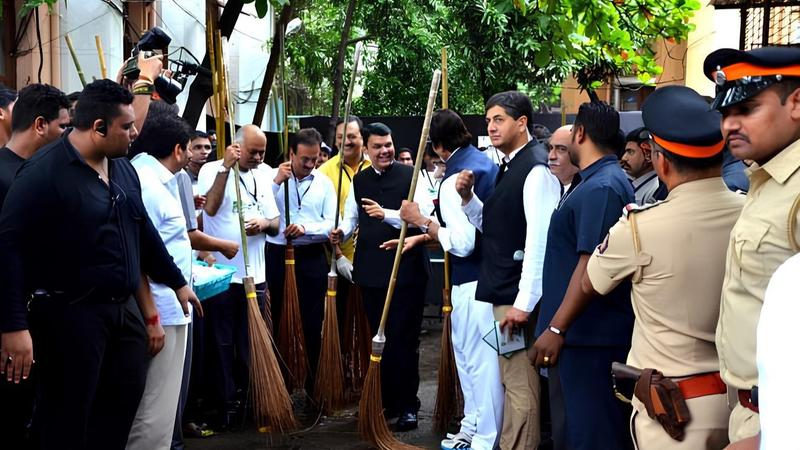Published 15:31 IST, December 27th 2024
Swachh Bharat 2.0: Devendra Fadnavis & Eknath Shinde Bring Global Innovation to India’s Waste Management Strategy
Starting from Waste to Wealth, the Maharashtra Government's Revolutionary ICT-based Swachh Bharat Mission 2.0 sets a Global Benchmark in Urban Waste Management.

Urban waste management has always posed a challenge to the rapidly growing cities. The traditional collection and disposal of waste do not ensure efficiency and transparency. The government of Maharashtra was well aware of this fact. Hence, it has relied upon ICT to transform the state's waste management system.
A new revolution, Swachh Bharat 2.0, is emerging on the busy streets of Maharashtra with innovation and traditional thought blended. The initiative in the hands of the new team led by Devendra Fadnavis and Eknath Shinde is set to establish the Indian waste management system as a new global standard.
Swachh Bharat 2.0 brings a brighter light for a cleaner and greener future. More than a policy, Swachh Bharat 2.0 is a movement that includes Indigenous solutions with international innovations to bring India into the global radar for eco-friendly waste management methods.
The Visionary Behind Swachh Bharat 2.0
Maharashtra is moving on to develop its waste management processes by including the revolutionary technologies and systems that other countries have been adapting in this direction, as mandated by Devendra Fadnavis and Eknath Shinde. The implementation of circular economy models, the construction of waste-to-energy plants, and the composting technique have become crucial for states to reduce the amount being sent to landfills.
Swachh Bharat 2.0 strives to address the issue of waste disposal but also pays more attention to the recruitment of the recycling and upcycling sectors, which turn waste into circularity while reducing the reliance on landfills.
Present Chief Minister of Maharashtra, Eknath Shinde has very long experience in grassroots governments. Because of his intimate understanding of regional concerns, he is uniquely qualified to build policies that would meet both the priorities and needs of urban and rural communities.
On the other hand, Devendra Fadnavis has also received recognition for his leadership in enacting revolutionary policies like the water-saving “Jalyukt Shivar” program into action. His deep understanding of regional concerns and priorities makes him uniquely suited to develop policies that will serve both the urban and rural communities. In his recent address, he summed up the ethos of this ICT-based revolutionary solid waste management approach: “ह्या दुसऱ्या टप्प्या मध्ये विशेषतः ICT-Based अशा प्रकारचा जो काही मॉड्यूल आपण आणलेला आहे… ह्याचा मुळे कार्यक्षमता पण वाढते, ह्याचा मुळे विश्वासार्हता पण वाढते आणि ह्याचा मुळे जबाबदारी पण वाढते… कारण कुठलेही शासकीय काम मध्ये जोपर्यंत जबाबदारी नसते तोपर्यंत ते काम परिवर्तन करू शकत नाही…” (In this second phase, particularly with the ICT-based module we have introduced, efficiency increases, credibility grows, and accountability is enhanced.
Without accountability, no government initiative can drive real transformation). This quotation emphasizes how ICT can revolutionize waste management systems by increasing their standard of accountability, efficiency, and transparency.
International Innovation and Local Implementation
More than ever, the country requires the innovation of waste management. According to the Ministry of Housing and Urban Affairs, only 70% of India's annual generation of waste-more than 62 million tons, are collected; even fewer are processed. Under the directive of Fadnavis and Shinde, Swachh Bharat Mission 2.0 is all geared to employ novel technologies in countering those problems.
The movement is remarkable for fusing local realities with international standards of excellence. India will witness technological transformation inspired by Sweden’s zero-waste model and Singapore’s high-tech waste-to-energy plants. The innovative approaches can be beneficial in many ways:
Improved Waste Tracking: ICT offers the facility for real-time monitoring, which ensures efficient waste collection and proper disposal throughout Maharashtra.
Proficient Decision Making: ICT system data reduces the cost of operation and enhances waste management strategies.
Enhanced Public Participation: The digital platforms allow citizens to report problems and learn about waste segregation.
Sustainable Practices: ICT supports environmental sustainability through less landfill usage and increased recycling.
Apart from this, the mission focuses on implementing strong waste management plans and making all villages and urban areas open defecation-free (ODF).
Setting a New Standard for India
Maharashtra has emerged to lead the implementation of Swachh Bharat Mission 2.0, primarily driven by the collaborative efforts of Eknath Shinde and Devendra Fadnavis. India has assumed a new leadership role globally with respect to environmental sustainability on account of its cleaner cities, environmental sustainability, and adaptation of international innovation in waste management strategy.
By adopting international innovations and through the use of technology, the state is transforming its waste management strategy into an example of effectiveness, legitimacy, and responsibility. Along with advancing the Swachh Bharat vision, Maharashtra is rewriting it as it moves boldly toward a cleaner, greener future.
Updated 15:31 IST, December 27th 2024



